- Home
- Tim Winton
Minimum of Two Page 8
Minimum of Two Read online
Page 8
‘Put those bloody credit cards away,’ Hart said when they had quieted down. ‘That one’s a parking token, for God’s sake, and this one, is this for opening other people’s hotel doors?’
‘Just a simple man with a simple man’s capitalist foibles.’ Their bottle of Rosemount came. It lay awhile, sweating in its bucket of ice.
Clive’s face straightened out. ‘You look tired, mate. How’s work?’
‘Rough. The whole Unit’s in chaos. We admitted this kid yesterday who prolapses his anus at will. No one knows what the hell to do. Medical staff gave up, that’s why we’ve got him.’
‘He does what?’
‘He sits in a corner and pushes so hard his arse turns inside-out. After meeting his parents, pushing arse doesn’t seem such a silly thing to do.’
Clive winced. ‘Parenthood.’
‘Oh, don’t worry, you do all right, you and Jan.’
‘Actually,’ Clive said, eyes narrowing, ‘Jamie has this habit of sticking his finger up his bum during his bedtime prayers. Gives him a rather contemplative look, really. Should I worry?’
‘I’m a nurse, mate, not a theologian.’
They poured their wine and sat watching the traffic pass. It was peaceful here away from all that hopeless tangle.
‘Speaking of theology, I rang a black clergyman today,’ Clive said.
‘Oh? Where’s he from?’ Hart watched a woman ride by with a laundry basket on her back.
‘South Africa.’
‘What?’
‘Yeah.’ Clive grinned. ‘I rang Bishop Desmond Tutu. Toots to his friends.’
‘Bullshit.’
‘I did, I really did. We had a good old chat.’
‘What, for your Tory mates?’
‘Cynic! No, for myself. I asked him a few naive questions. He was late for a dinner appointment. I taped it for you. Just to show you I’ve got a social conscience.’
‘What’d he say?’
‘Pray. And get ready to pick up the pieces.’
Their entrée arrived. Hart picked at his terrine; it was perfect but his appetite was leaving him. Clive ate and drank, and Hart felt him watching. Hart could feel himself sinking. Hold on to this, he told himself; this is good, this man, this food, this day; hold on.
‘Another announcement,’ Clive said.
‘Let’s hope it’s good news.’
‘Unexpected, but good. Jan’s pregnant again.’
Hart felt the shock drop in him like a stone in a well. ‘Oh.’
‘Three months gone.’
‘Are you sure?’
‘A doctor told her. Technology told him. You know my weakness for technology.’
‘Congratulations.’ Hart saw the puzzlement on his friend’s face. He ordered another bottle of Chardonnay. The meal was beautiful, dreamlike, graceful, but Hart felt disabled. He was unequal to it. Clive and he talked on, moving from children back to politics, onto their mutual hatred of football, then back to children, but Hart felt as though he was impersonating himself. He felt himself slipping. He drank more; ordered another bottle to cover his strange feelings of grief and anxiety.
When they parted just before three, Hart was drunk. He left Clive bemused in the car park and walked home along Oxford Street to sleep up for the evening shift. He thought about that voice in the dream. Yes, it was the voice of a public servant, a hospital administrator. Contempt soothed him for a moment. Bloody dreams. The thought came to him: What if she did die? What then?
During the next week Hart spent hopeless hours with the little boy they called The Pusher. Too much time, he knew. But it seemed desperately necessary to break into that ten year old before the case conference at the end of the week. Hart was agitated by the idea of this child at the mercy of the psychs and their useless academic curiosity. Hart wanted him out, better, gone. He knew he was panicking; it was as unprofessional as hell and he didn’t care. Coming across The Pusher alone in a corner, pushing till his eyeballs surged, Hart whispered ‘What, you trying to move the fucking world?’
He gave himself till the end of the week before he’d sign himself off. He was losing it. He was lost.
When he woke in the afternoons, the house was big and empty. After all this time it was still hollow without Andrea, and now he wondered whether he mightn’t have lost himself as well. He watched TV. There he was, every evening, that little black priest at the head of a snaking mob with the white soldiers looking on from their armoured cars. There was a man who’d found himself, he thought.
On Tuesday he saw a woman in the street whom he mistook for Jan Genders. He called out to her and when she turned around he saw it was a stranger, a woman with a small, bright mouth and green eyes. He wasn’t so much embarrassed as angry. He felt robbed. His fury did not abate. On TV that nervous little black man stood with his mouth open in the rising dust.
On Friday morning, Clive rang to cancel lunch at Picnicks.
‘The old girl’s a bit off colour. Think I’ll go home and have lunch with her.’
Hart rang the Genders’ home.
‘I heard you’re a bit crook,’ he said.
‘Hart?’
‘Yeah.’
‘I’m having what you call a suspected miscarriage.’
‘Oh, God.’
‘You don’t believe in Him, leave Him the hell out of it.’
‘Do you?’
‘When I can.’
‘I had a dream.’ Jesus, he was desperate. But for what?
‘Martin Luther King.’
‘What?’ What? What? God, he was gonna burst into tears any minute.
‘Forget it, boy. Clive isn’t home.’
‘I . . .’
‘The doctor says I probably won’t lose it.’
‘Clive believes in doctors.’
‘The doctor told me to stay in bed.’
‘Oh. Sorry.’
She rang off. He stood there, hot, breathless. He went for a walk.
Across the road from Picnicks in a greasy little pinball joint, he ate a hamburger. He could see the flashing neon sign and the table in the window where he and Clive always sat. He was filled with self-contempt; he felt like a waif with his nose against the glass.
Home again, he rang off sick. He couldn’t work. He couldn’t force it anymore. The case conference would be in progress now; the psychs would be devising a neat theory; The Pusher would be turning his arse out in a corner. Opening his fists by force of will, Hart said out loud: ‘I am not coping.’
The weekend came and Hart stayed in the cold house. He took out the cassette Clive had given to him and played it over and over.
My friend there is terrible violence to come, but we must resist. There is no choice for us. There is no choice for me. Pray for us. If you can do nothing else, pray . . .
On Saturday afternoon Hart walked down to the local pub on the corner. Its walls were adorned with smoke-stained fishing trophies, a turtle shell and a jumbo crayfish, the tail of which had fallen off years ago. Andrea and he had decided here one afternoon to get married. They were back two years later arguing the terms of separation. Hart drank in tempo with that horrible slipping feeling. The foul cloud of smoke and talk and memories pressed in. She’ll lose that baby, he thought; and I feel guilty already, like it’s something to do with me. Me! He drank up. To hell with them.
Following his feet up the hill, he thought about that dream. What was it supposed to be, the voice of God, for Chrissake? Yeah, Clive’s little Protestant deity. Yeah, I can see him as a bloody hospital administrator.
In the night he was woken by another dream. In it, Bishop Desmond Tutu led an endless procession like those he’d seen on TV. Funerals, mass funerals. There was dust and chants and black hands and pink upturned palms. As the crowd drew near he saw the coffins. There they were, atop the long, sealed boxes, the white bodies of people he knew. Andrea, Jan (so white), Clive, The Pusher. In his dream Hart leapt down from an armoured car, bashed through the cordon, and ran out onto the
dusty road. The small, robed black man, spectacles glinting, paced with shoulders down. Hart ran towards him, but the bishop held a hand up to him, signalling him to keep away. Dust was everywhere like incense. That pink palm turned against him.
He was awake. His head throbbed.
Sunday evening the phone rang out in the cold house. It seemed about right to Hart. He answered.
‘She lost it.’
‘Oh, Clive.’
‘She’s all right. They say it was dead for a week anyway.’
‘Was it . . . hard going for her?’
‘Fucking awful. Worse than having a live one.’
‘Were you there?’
‘Of course I was. Oh, God.’ Clive sighed; it was a dead sound.
‘You all right?’
‘She wants to come to Picnicks on Friday. All right with you? Wants to break a few traditions.’
Hart stiffened. ‘Sure.’
‘I know you find her a pain in the arse.’
‘No, that’s not true.’ He looked out of the window and saw the lights of the city. He was lost. ‘Christ, it’s all so bloody futile, isn’t it?’
‘No, just a little complicated. Not futile.’
Hart sighed. ‘The little Protestant deity, eh?’
‘Ah, you see? We’ll make a spiritual giant of you yet.’
Hart listened. He heard Clive pause as though swallowing something. He heard him sniff. And then, down the line, out of the hollow night, Hart heard him laugh. It was strong. It was rich. With the lights of the city presenting themselves dumbly to him, Hart felt his whole being straining, holding onto that sound.
More
I
HE PAUSES AT the door and wonders about lipstick. The house is in darkness. He breathes through his teeth, feeds the key in, opens the door. In the bathroom he strips and he stuffs his clothes deep into the laundry basket. He crushes them down. The mirror shows him his white face. On the kitchen table, held down by an apple, there is a note. Gave up waiting. He creeps to the bedroom. Streetlight divides the bed. Two figures jacknife across it, one large, one small. He eases out. Down the hall he folds into the little bed with the Mickey Mouse quilt. Mobiles hang from the ceiling. He switches the light out, but he senses the shiny bright things turning in the dark above and his heart won’t ease up. He puts the nightlight on again and looks up at the mobiles: fish floating on some hidden draught. He gets out of bed and goes to the little wardrobe. On it there is a photograph in a perspex frame. It shows a blood-spattered, unshaven, mad-eyed young man looking into a humidicrib which holds a baby. The baby is big and battered-seeming. The young man in the picture looks hungry for it. He takes the paper from the frame and holds it up to the nightlight. He watches for movement, but all that moves is his heart in his chest, butting blindly against itself. And he sleeps. The bed smells of his son. He feels himself sink into that sweet Johnson & Johnson smell, knowing, even as he swims into sweetness with fish flying above, that everything is not all right.
The weekend before Rachel’s exams, they drove north to Guilderton for the weekend. The evening air was full of the smell of coming heat. In the warm night on the verandah they played their mongrel game of chess. Jerra liked a skirmish. He didn’t care so much for victory; he just liked to mow a path now and then, to see pieces fall. Rachel told him he had the tactics of a blind bull. She was reading Hemingway. He nodded. He wanted to ask her how she was liking Hemingway, but he just made his moves and watched the streaks of smoke from the mosquito coils. Now and then, the flash of the lighthouse broke the night. He drank too much beer. He lost the game and followed her to bed.
‘Hope no one turns up,’ Rachel said in the darkness a moment before he was finally asleep. The curtains lit up a second before leaving them again in darkness.
‘Who?’ he asked, after a pause.
‘Our friends. Anyone. I want some peace.’
‘And quiet. Don’t tell me, I know.’
‘It’s just the exams, and everything. I’m going mad.’
‘Yeah.’ Assignments, essays, exams, textbooks. God, he was sick of it. ‘No one’ll turn up.’
‘I hope not.’
‘Blame me if they do,’ he said.
‘Why?’
‘I’m unlucky.’
In the night, Sam woke and he cried for two hours and ten minutes. He kicked and scratched and drooled as each of them tried to comfort him, and then they began shouting at each other and in the end Rachel wept.
‘Why are you like this, Jerra?’ she called, holding Sam away from him.
‘Everything’s gone to shit. Your misery is contagious.’
‘Oh, you can’t bear other people’s sickness or unhappiness, can you? You can’t tolerate it.’
Sam ceased wailing and fell abruptly to sleep.
‘I know,’ said Jerra, lowering his voice. ‘I’m not patient enough.’
‘Not mature enough.’
‘Don’t social work me, for Chrissake. Okay, I know. That’s how I got into this mess. I was too young. I was stupid.’
‘Thank you.’
‘Thank you.’
Jerra prepared himself for more sobbing, but she climbed into bed with Sam and left him there. He stood for a while outside the door. There was excitement in cruelty, and the idea of it burnt him.
At the bend in the river, before it deepened off against the bar sealing its mouth, there was clean, shallow water and shade in the lee of the limestone bluff. Sam sat astride Rachel’s brown belly and splashed. A gull shadow passed over them.
‘Burr-burr!’ Sam yelled.
‘Bird,’ said Rachel.
‘Bird,’ said Jerra, wishing she would turn her head and meet his eyes with a smile.
He lay back in the water, shifting on the tide-ribbed bottom, until only his mouth and nose were above the surface, and with his eyes open he saw the sky through a shifting filter of river water. He stayed there. He remembered a night when the colicky sawing of baby screams pierced him finally and truly, when he tore Sam from his neck and held him out and shook him till his head might come away. It was in the moment before slamming the little body into the wall that he lay him on the bed and went outside into the scathing forest cold. The crying stopped suddenly, and he thought he’d killed him. Rachel was too sick to know. And Jerra stood alone out there with the Godlike silence towering at him. He knew then that he was capable of the darkest things.
Jerra lurched upright, sputtering.
‘Allo,’ Sam said.
‘Hullo, mate.’
Rachel made no comment as he went off on his own in the afternoon when heat was fattening the air. He took a flick rod and a knife and bucket. The sun glowered and stung his skin. From a rock in a deep bend of the river, he fished for bream using worms and a small amount of lead. He stubbed a toe and lost a rig. Two little girls joined him, and they fished like experts. They giggled when he begged tackle off them. One of them caught a gobbleguts. Jerra then lost a second rig and was too embarrassed to ask again, so he left them to themselves. As he walked away, it occurred to him that they thought he was an old man. A funny old man. He was twenty-four years old.
Sam and Rachel lay asleep in the hot little beach house. He sat and waited, listened to his blood.
At dusk, cutting lemons for the salad, Jerra saw the knife-steel sink into his finger.
‘Shit. I’m cut.’ He began to dance. ‘It’s bad.’ He stopped. There was blood on the linoleum. He went back to the sink. For a moment, in the madness of shock, it occurred to him that he might have cut the whole finger off, and he began to shift the gore-smeared dishes about, looking for his fingertip. But then Rachel grabbed his hand and lashed a teatowel to his finger. The kookaburra prints on the linen began to blush.
At the first-aid station beside the shop and garage, the little man told him the wound would need sutures.
‘It’s a biggun,’ he said. ‘Probably sev-eared the nerves.’
Jerra watched him wrap it in a constrictive bandage
, and was disturbed by the grease on the man’s hands. He’d never been ministered to by a mechanic.
‘Have to get a doctor onto that. Gingin’s the closest town. Do it in the morning, unless you’re worried.’
Rachel looked at him. ‘You worried?’
Jerra shrugged.
‘Well, I’m not worried,’ she told the man.
All night Jerra lay with his hand throbbing. Sunburn caused his skin to feel as though it was shrinking on him.
He saw oily limbs and the twist of momentum. His head in the cradle of her pelvis. Smelled the pungent shifts in her. He saw. He saw. He saw that she was not Rachel.
At dawn he woke and wondered how he could possibly move, get up, get out of bed and go on. He felt like the maze was closing on him.
Hot wind blew through the car on the way back from the doctor’s. His finger was tight with numbness and through it he swore he could feel the sutures moving. His back stung. He winced at every bump in the road.
‘I know about it, Jerra.’
It wrenched him around in his seat. ‘About what?’
‘Quiet, you’ll wake Sam.’
‘Know what?’ he murmured.
She drove. He shored himself against her tears, but she just drove and nothing came.
They’d been back ten minutes when Rachel came running into the kitchen. Jerra braced himself.
‘Sam’s eaten Ratsak!’
He wilted with relief.
‘Poison, Jerra!’
Sam smiled. His white hair stood at odds with itself. There was a rime of green around his mouth. Jerra seized him and took him to the sink. He prised open his mouth with a finger. Sam giggled. Jerra reached into the tiny throat. The giggle choked off into a cry of alarm. Jerra felt the teeth set into the flesh of his good hand.
‘Start the car.’
‘Who the hell’d leave rat poison around for kids to get into?’ Jerra muttered in the surgery. He paced around the doctor who held Sam over a bowl. Vile black stuff was coming up. Sam bellowed and gagged.

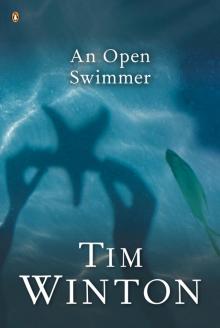 An Open Swimmer
An Open Swimmer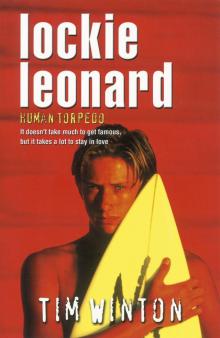 Human Torpedo
Human Torpedo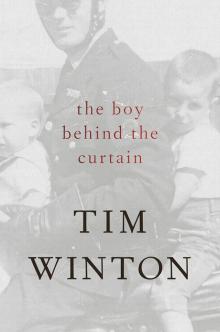 The Boy Behind the Curtain
The Boy Behind the Curtain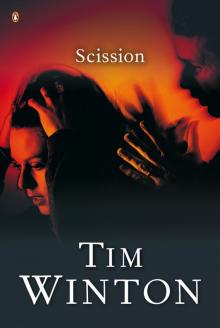 Scission
Scission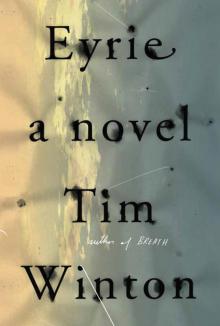 Eyrie
Eyrie Island Home
Island Home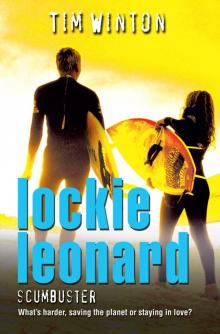 Scumbuster
Scumbuster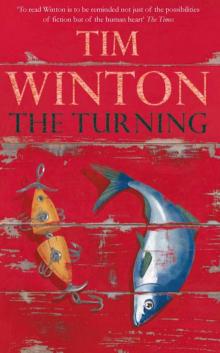 The Turning
The Turning Legend
Legend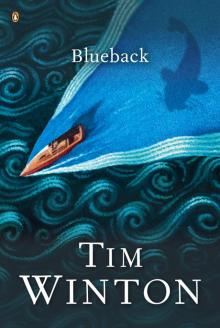 Blueback
Blueback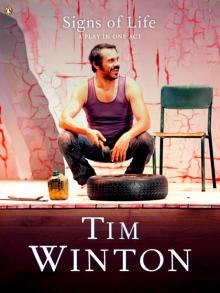 Signs of Life
Signs of Life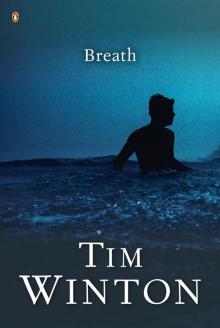 Breath
Breath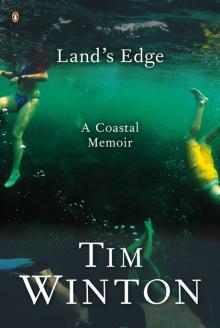 Land's Edge
Land's Edge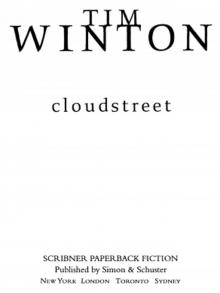 Cloudstreet
Cloudstreet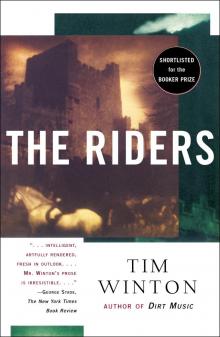 The Riders
The Riders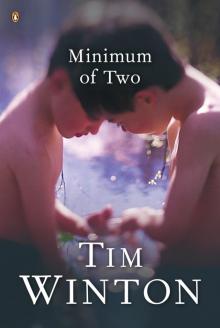 Minimum of Two
Minimum of Two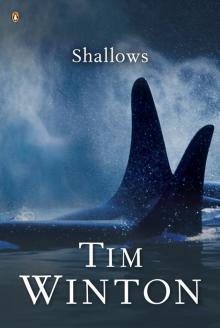 Shallows
Shallows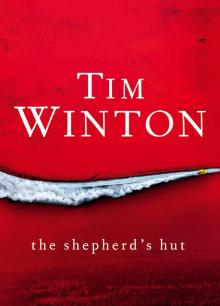 The Shepherd's Hut
The Shepherd's Hut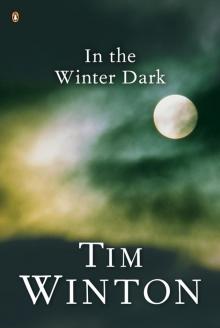 In the Winter Dark
In the Winter Dark